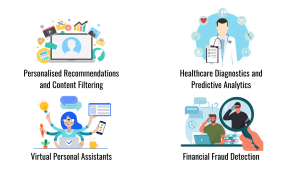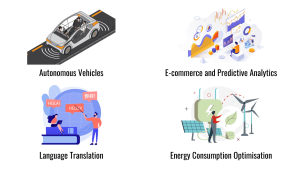Applications of Machine Learning in Everyday Life
Introduction Machine learning (ML), a subset of artificial intelligence, has emerged as a transformative force that is revolutionising various aspects of our lives. What once ...

Introduction
Machine learning (ML), a subset of artificial intelligence, has emerged as a transformative force that is revolutionising various aspects of our lives. What once seemed like science fiction is now an integral part of our daily routines. From personalised recommendations on streaming platforms to fraud detection in financial transactions, machine learning is ubiquitous. In this article, we will explore the practical applications of machine learning in everyday life, shedding light on how this technology is reshaping our world.

Personalised Recommendations and Content Filtering
One of the most noticeable machine learning applications is in the realm of personalised recommendations. Streaming services like Netflix and music platforms like Spotify leverage machine learning algorithms to analyse user behaviour and preferences. By understanding viewing or listening habits, these platforms provide tailored content recommendations, ensuring a more engaging and enjoyable user experience.
Virtual Personal Assistants
Virtual personal assistants, such as Apple’s Siri, Amazon’s Alexa, and Google Assistant, owe their intelligence to machine learning. These digital companions use natural language processing and machine learning algorithms to understand and respond to user queries. From setting reminders to answering questions, these assistants continuously learn from user interactions, enhancing their ability to provide relevant and accurate information.
Healthcare Diagnostics and Predictive Analytics
Machine learning is making significant strides in the healthcare sector, particularly in diagnostics and predictive analytics. Algorithms can analyse medical data, such as imaging scans and patient records, to assist doctors in diagnosing diseases like cancer more accurately. Additionally, predictive analytics can help identify potential health issues by analysing data trends, enabling early intervention and preventive care.
Financial Fraud Detection
Financial institutions deploy machine learning algorithms to detect and prevent fraudulent activities. By analysing vast amounts of transaction data in real-time, these algorithms can identify unusual patterns or behaviours that may indicate fraudulent activity. This proactive approach helps protect individuals and businesses from financial losses due to unauthorised transactions.

Autonomous Vehicles
The automotive industry is at the forefront of incorporating machine learning into everyday life through the development of autonomous vehicles. Machine learning algorithms enable these vehicles to perceive their surroundings, make decisions in real-time, and navigate safely. From advanced driver assistance systems to fully autonomous vehicles, machine learning is driving the future of transportation.
Language Translation
Language translation applications like Google Translate leverage machine learning to provide accurate and contextually relevant translations. These algorithms continuously learn from user inputs and correct translations, improving their accuracy over time. This technology facilitates effective communication across language barriers, making information more accessible globally.
E-commerce and Predictive Analytics
E-commerce platforms utilise machine learning for personalised product recommendations, pricing optimisation, and inventory management. Predictive analytics can forecast customer demand, helping businesses optimise their inventory levels and ensure timely product availability. This not only enhances the customer shopping experience but also improves operational efficiency.
Energy Consumption Optimisation
Machine learning is employed to optimise energy consumption in various settings. Smart home devices, for example, can learn user behaviour and adjust lighting, heating, and cooling systems to maximise energy efficiency. In industrial settings, machine learning helps optimise energy usage by predicting demand patterns and adjusting production accordingly.
Conclusion
Machine learning is no longer confined to the realm of specialised technology but has seamlessly integrated into our everyday lives, offering solutions to challenges across diverse sectors. From enhancing entertainment experiences to improving healthcare diagnostics and powering autonomous vehicles, the practical applications of machine learning continue to evolve. As this technology advances, its impact on our daily lives is only set to grow, ushering in a future where intelligent systems work collaboratively to make our lives more convenient, efficient, and enjoyable.